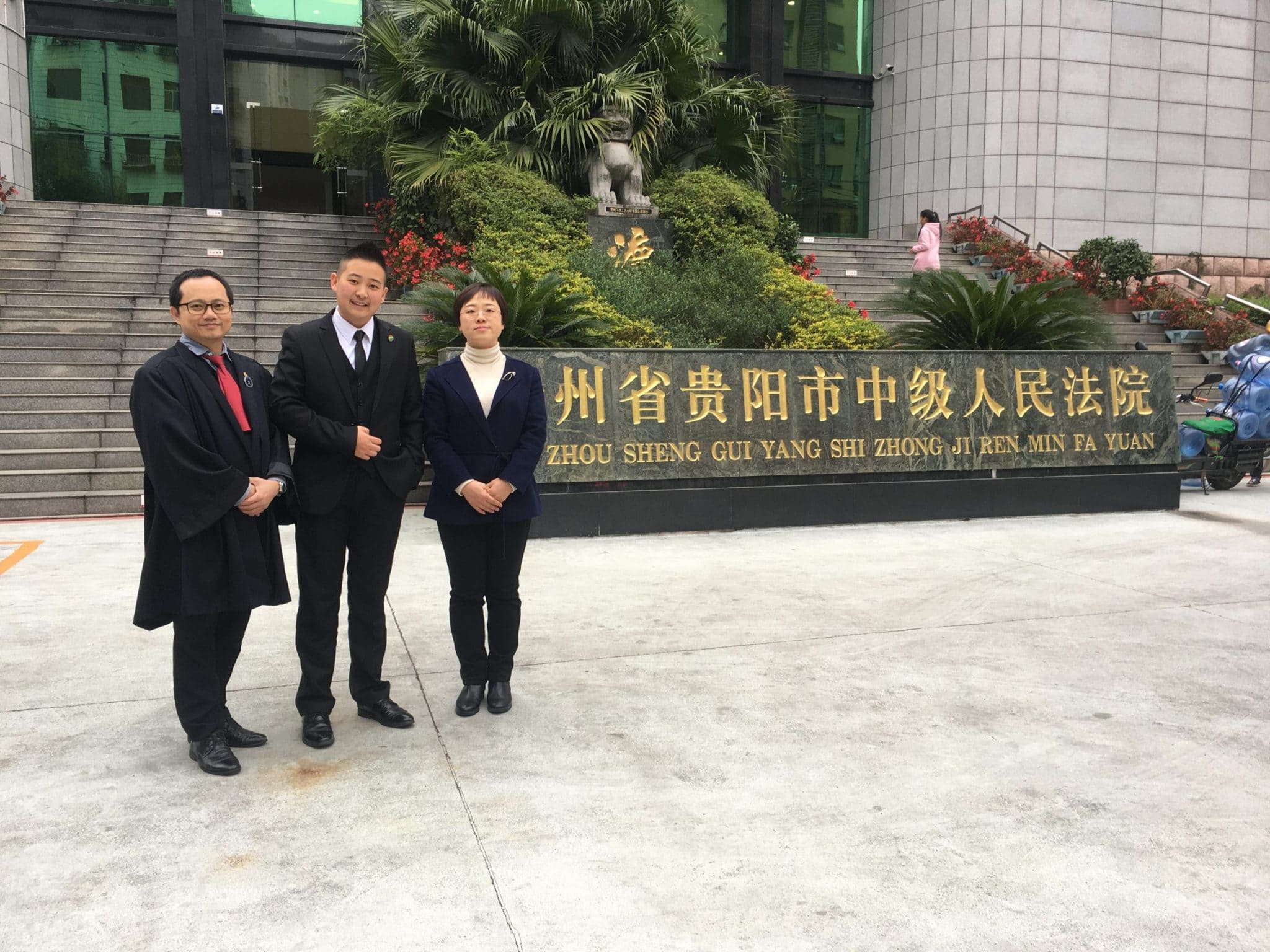
Mr. C (centre), expert witness He Xia (right) and lawyer Qiu Hengyu (left) in front of the Guiyang Intermediate People’s Court. (Courtesy of Common Language)
An appeals court in China’s southwestern city of Guiyang has maintained the original verdict in favour of the plaintiff in the country’s first lawsuit over transgender discrimination in employment. The ruling also states, for the first time in China’s judicial practice, that an individual’s gender identity and expression should be respected.
The 30-year old transgender man, known only by the nickname of Mr. C for the protection of his family, got the axe eight days after starting work for Ciming Checkup, a health examination centre in Guiyang, as a salesman in April 2015. “Ciming’s HR manager complained to a colleague that the way I dress is unhealthy, and that only homosexuals dress like that,” Mr. C told CDB last Wednesday.
After suffering from deep depression for a year, Mr. C decided to bring the case to court. He filed two lawsuits, a labour dispute lawsuit and a general personhood rights (一般人格权, a Chinese legal term) lawsuit. In December 2016, the litigant won the labor dispute case. The court of first instance found that he was improperly dismissed and ordered the health centre to pay him for his work and provide a compensation of 1,500 yuan.
In the general personhood rights lawsuit the court found in favour of the plaintiff in July 2017, in a first-of-its-kind ruling claiming that the plaintiff’s equal employment rights had been infringed and that the defendant should pay Mr. C a compensation of 2,000 yuan for his mental distress. However, the verdict did not support Mr. C’s claim that the behaviour of the accused constituted gender discrimination, or endorse his request for an open apology.
Insisting on an apology, Mr. C went for a second appeal. On February 4th 2018, the final judgment was handed down in the general personhood rights case. The bias against transgender people is still found to be unproven due to “lack of evidence”, and the appeal for an apology has again been rejected.
However, the Guiyang Intermediate People’s Court has unprecedentedly stated in its verdict that “workers should not experience differential treatment based on their gender identity and expression”, and “an individual’s gender identity and gender expression falls within the protection of general personhood rights”.
 An excerpt of the final verdict
An excerpt of the final verdict
This explicit protection of gender identity and gender expression is considered to be a big step forward by experts and activists.
“The verdict has laid a solid foundation for safeguarding the legal rights of sexual and gender minority groups in the future”, said a legal researcher from Common Language, a domestic NGO focusing on eliminating discrimination against the LGBT community. Common Language provided both legal and community support to Mr. C during the entire proceedings.
Current Chinese laws on employment discrimination protect labourers from being discriminated against based on their gender. However, the definition of “gender” is not specified, somewhat leaving sexual minorities outside of the umbrella, since biological sex is still the mainstream understanding of gender in China.
He Xia, an expert witness in the general personhood rights lawsuits, and associate professor at the Southwestern University of Finance and Economics specialised in anti-discrimination law, said that bringing up the terms ‘gender identity’ and ‘gender expression’, saying that they should be respected and acknowledging them as part of the general personhood rights in a verdict, to some extent provides an explanation for the term “gender”.
“Being transgender is about gender identity and gender expression”, He Xia told CDB in an interview last Friday, “most of the time, transgender or sexual minorities are invisible to the legal system due to the misunderstanding and stigmatisation of wider society. This statement is like an official response to this community, and a sign that they are finally noticed by the system”. “This is a big progress because the first step to solve a problem is to get it seen or heard,” she added.
Although it constitutes big progress, the final ruling still leaves some space for regrets. “In China’s general personhood rights lawsuits, the onus of proof lies with the plaintiff, yet in cases of employment discrimination, it is often very hard for employees to provide direct evidence of discrimination by employers,” explained He.
Speaking to CDB, Mr. C said that the final ruling is a breakthrough for him as an advocate of equal employment rights. But as a victim of discrimination, he finds the result unfair. “All I want is an apology, and an apology means respect”.
Yet Ciming might not be the only company that owes him an apology. It was not until a few days ago that the 30-year-old finally got a new job in the IT industry, the first one after his dismissal in 2015. During more than two years of job hunting, he claims that he was rejected many times due to his gender identity. Drowning in self-doubt, he even attempted to commit suicide.
Mr. C is by no means the only one to suffer in this way. In China, the work environment for the transgender community is far from satisfactory. According to a national survey investigating the status of China’s transgender and gender-nonconforming population launched by the Beijing LGBT Center in 2017, the risk of unemployment among the transgender community is approximately three times as high as that of the general population. 24.58% of respondents thought that their work environment was unfriendly towards transgender people in general.



